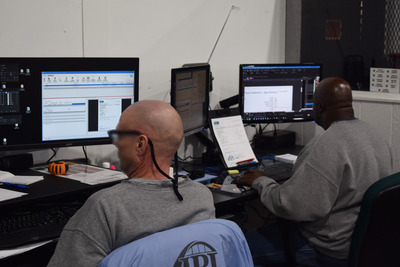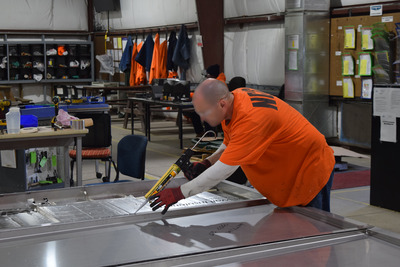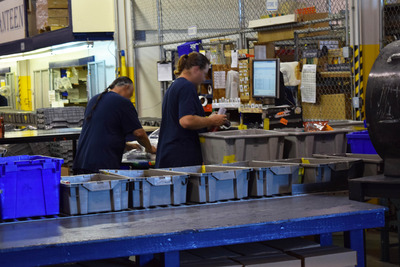Benefits Of IPI
IPI’s work training program provides significant benefits to our program participants as well as Iowa’s correctional facilities, our customers, and Iowa’s citizens and taxpayers.

Benefits to Correctional Facilities
Reduced Idleness
Having a work assignment that promotes self-improvement and looks towards the future lends a sense of purpose to an incarcerated person’s time in prison. Work allows them to prepare for their release, keep busy, and focus on something other than their incarceration. IPI’s training programs give its participants something to look forward to each day and help shift their time in correctional facilities into a positive experience.
Incentives
In order to train in IPI’s program, incarcerated individuals must meet a list of expectations, including a period of good behavior within the facility. Once someone is chosen to work in the program, they must maintain that good behavior throughout their time with IPI. The opportunity to work for IPI gives men and women an incentive to be the best version of themselves.
Lower Cost of Incarceration
Incarcerated men and women working in IPI programs create less drain on the government appropriations needed to maintain our prisons as they are kept busy throughout their workday under the supervision of IPI staff rather than DOC security officers. Private sector participants have room and board held out of their wages, which results in less of a financial burden for correctional facilities and their upkeep costs.

Benefits to Inmate Participants
Marketable Job Skills
IPI program participants can learn a variety of skills in our shops that are transferable to jobs in the private sector upon release. Over 90% of inmates in Iowa’s prisons will eventually be released; while success upon release depends on many factors, the ability to find steady employment is important.
Work positions vary by shop, but examples of skills learned include data entry, welding, assembly, CAD drawing, Braille transcription, sewing, graphic design, warehousing, and packaging just to name a few. IPI participates in the DOC’s apprenticeship programs as work hours in IPI shops can count towards the on-the-job training requirements of the apprenticeship.
All participants learn Lean Methodology with IPI’s Prison Industries Manufacturing & Management System (PIMMS). Lean methods such as Standard Work, 6S, Kaizen Events, Process Problem Solving, and Metrics Boards are utilized daily in our facilities.
In addition, participants in IPI’s training programs learn or improve more intangible skills needed to be successful such as having a sound work ethic, participating in work reviews, teamwork, the desire for self-improvement, and much more. These types of skills give inmates the confidence needed to overcome the obstacles they will face when applying for jobs on the outside.
Income
Inmates participating in an IPI program earn higher wages than other work assignments in the prisons. Traditional shop participants earn an average of $1.15 per hour while private sector workers earn prevailing wages.
Being self-sufficient while in prison means they are not as reliant on family support to purchase canteen items or to pay for phone calls and the like. Private sector workers have child and family support, victims' compensation and restitution, and room and board held out of their wages as well. Inmates also save for release. Generating income while in prison allows them to be in a better financial position upon release.
Sense of Purpose
Having a work assignment that promotes self-improvement and looks towards the future lends a sense of purpose to an incarcerated person’s time in prison. Work allows them to prepare for their release, keep busy, and focus on something other than their incarceration. IPI’s training programs give its participants something to look forward to each day.

Benefits to Iowa’s Communities
Support of Local Economy
All IPI facilities are located right here in Iowa. When working with IPI, you are working with your Iowa neighbors. Our staff live in your communities and support the local economies. When possible, we purchase raw materials and supplies from local businesses, further supporting our local economy.
A Trained Workforce
IPI program participants can learn a variety of skills in our shops that are in-demand by Iowa businesses. Work positions vary by shop, but examples of skills learned include lean, data entry, welding, assembly, Braille transcription, sewing, graphic design, warehousing, and packaging. IPI strives to keep our equipment and processes up to date so that our program participants use the same technology and equipment as they will use after release. Upon release, previously incarcerated men and women are typically eager to find and keep gainful employment and often prove to be reliable employees.
Lower Recidivism Rates
Recidivism is the act of an individual leaving prison (parole/special sentence, work release, or discharge) who is then reincarcerated within three years for any reason. Lowered recidivism rates mean less reentry into Iowa’s Correctional Institutions resulting in less costs to the Department of Corrections for the cost of incarceration. Iowa's recidivism rate is currently 34.2%, and work training reduces this number by 8%. For more information on recidivism in Iowa, please visit the Iowa Department of Corrections website.